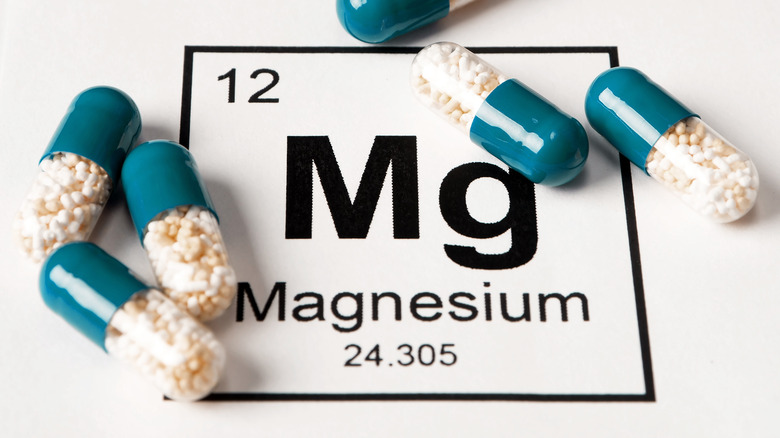Is Your Body Building A Tolerance To Magnesium?
The Academy of Nutrition and Dietetics (AND) writes that magnesium is an important mineral in human health. It is involved in over 300 enzymatic reactions in the body that help regulate functions like energy production, muscle contractions, and protein synthesis. It also helps maintain bone and heart health.
It is best to meet your magnesium needs through diet. AND notes that the recommendation for women 19 and older who are not pregnant is about 310 to 320 mg per day. Men in the same age group are advised to shoot for about 400 to 420 mg per day. According to the Mayo Clinic, good sources of magnesium include foods like nuts, seeds, beans, whole grains, leafy vegetables, yogurt, milk, and other foods that have been fortified with the nutrient.
Sometimes, however, people are not able to get enough in their diets, especially if they have medical conditions like type 2 diabetes or celiac disease. In these cases, it can be helpful to take supplements.
If you're taking magnesium supplements but they aren't working as well as they used to, you may be wondering if it's possible to build a tolerance. Dr. Stacie Stephenson, a chiropractor and functional medicine expert, explained to Mindbodygreen that there is no scientific evidence of this. However, there could be some other reasons why it's lost its efficacy.
Why magnesium might become less effective
Healthline states if you are finding yourself low on magnesium, despite getting it through diet or supplementation, there are two general reasons this might occur: decreased absorption or increased excretion. GoodRx lists celiac disease, inflammatory bowel disease, and gastric bypass surgery as illnesses that might make it more difficult for your gut to absorb this vital nutrient.
You can lose magnesium whenever you throw up or have diarrhea. Additionally, there are certain drug interactions that can make you lose magnesium through your urine. Medications that interact with magnesium include diuretics like hydrochlorothiazide, antibiotics like aminoglycosides, cancer drugs like cisplatin, and proton pump inhibitors like pantoprazole. Certain medical conditions can make you lose magnesium through your urine, too, like diabetes, Bartter syndrome, and Gitelman syndrome. If you sweat a lot or have burns over a large portion of your body, this can cause magnesium to be lost as well. Finally, having an inflamed pancreas (pancreatitis) can cause magnesium to move out of your blood and into your cells, leaving you without enough in your blood. Pregnancy can sometimes cause this to happen as well.


